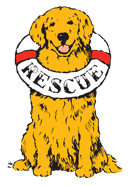You’ll encounter several stages as a puppy grows into an adult dog, and quite simply, the dog’s a teenager now. Just like teenage children, young dogs seem to think that rules don’t apply to them. They are full of themselves, have big egos, and figure that they’ve been around long enough to know better and test us at every opportunity.
My advice: Hang in there and stay-the-course. Have patience! Don’t yell and scream and stomp your feet. Make sure that training is part of your everyday routine. Don’t assume that the dog was trained, knows everything, and understands right from wrong. Don’t slack off on consistency and follow-through. Have a default behavior such as “sit” that you use for everything – before giving food or treats, before going out or coming in, before jumping in the car… everything. Praise and shower with attention whenever your dog is sitting calmly. Exercise is also key; the saying, “A tired dog is a good dog” definitely applies to the young dog, the canine teenager.
With that said, I know sometimes it isn’t easy…just like telling my daughter for the millionth time to pick up her socks or close the door. I’m told that eventually she will learn and remember to do it on her own, hopefully before she heads off to college.
With management and consistent positive reinforcement training, you can set your dog up for success. Provide plenty of chew toys (avoid rawhide), so your dog can burn energy chewing on appropriate items. Ensure that your young, intelligent canine teenager has plenty of mental stimulation and physical exercise.
Dog proof your home by keeping tempting items out of reach. Every time I leave the house, I place anything on the counter on top of the refrigerator or inside cabinets. Trash cans are inside closets. Baby gates and crates can be used very effectively. Be sure to always make the crate a positive experience and put your dog in a crate only after he’s had an opportunity to exercise and relieve himself. Never use it for a punishment.
Some things are just too tempting for a dog to pass up, so don’t blame your dog and scream that they were trained, that they know better, and did it out of spite. Dogs are not spiteful, but they are opportunistic.
Behavior that is rewarded will be repeated… and yes, knocking over a trash can and eating the contents is definitely rewarding for a dog! However, with a little help from you, they can make the right choices and be a good dog.


